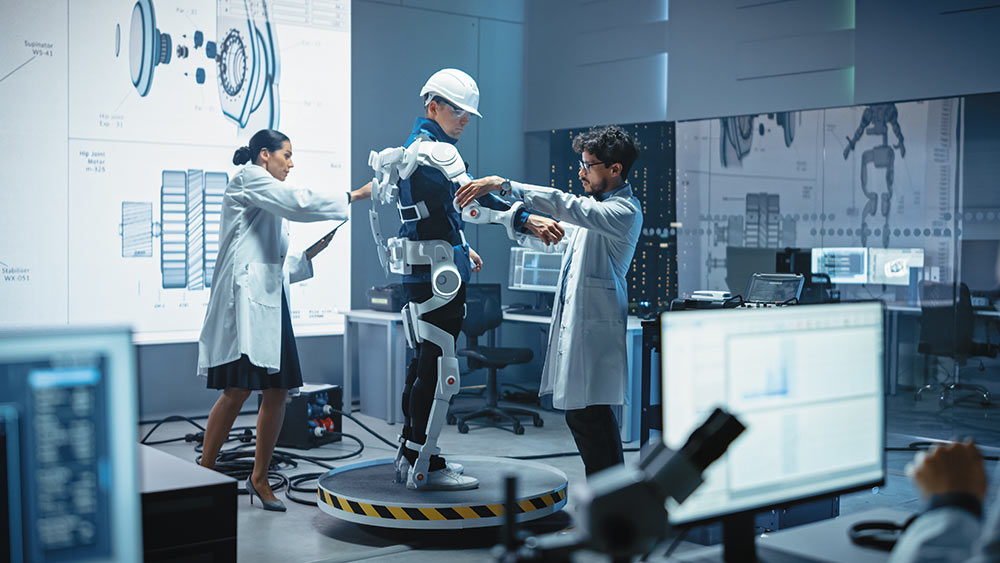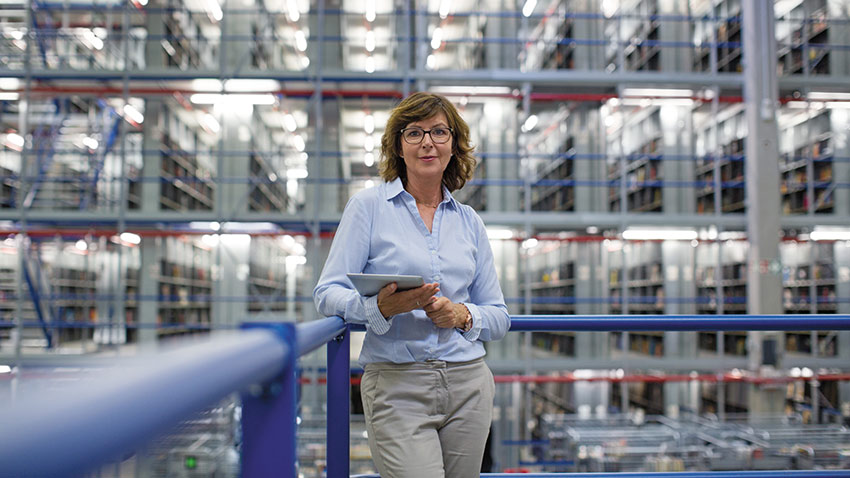In this fourth and final part of our blog series‘The warehouse of the future‘, we focus on the people in and around the warehouse. What new skills will you and your employees need to possess to make your logistics a success? Wondering what else the warehouse of the future has to offer? Then be sure to read our other articles on increasing automation in warehouses and the rise of greener logistics, among other things.
Just as the day-to-day world around us is changing, we are also seeing a lot of shifts in our workplace…. Will the technology now in full development solve all the new challenges? For example, are we moving towards 100% robotised logistics, with only engineers working directly on the supply chain? In what follows, you will discover that the warehouse of the future will guarantee a new mix between ‘human’ and ‘machine’. Time to go exploring!
A more people-oriented warehouse, but with fewer people
Within just a few years, many logistics professions will undoubtedly have already changed dramatically. More than ever, the search for employees with the appropriate degree and skills will be at the top of the priority list during the recruitment process. At the same time, many companies are switching to technologies that leave heavy logistics tasks to machines. This will boost productivity (with a reduced error rate) and make the human aspect of the job more attractive. In this way, we are creating a new reality that is, in a way, a paradox: the warehouse becomes a place with fewer people, but the people who work there become more central.

When a company decides to introduce a new technology on the shop floor, keep in mind that the expected benefit is to increase throughput at a lower cost. The functions the technology takes on do not pose a threat to maintaining and developing the human element. Along the one hand, new technologies provide increased throughput. Along the other hand, they can significantly reduce the workload for employees, freeing up space for other tasks. The time and space that technology frees up among your staff can then be cleverly reinvested. So in a win/win situation, any technological change does not necessarily have to be detrimental to the workforce. Quite the contrary, in fact!
Yvan Delannoy, Logistics Operations Manager at RAJA GroupExoskeletons and drones: essential for your workers?
Exoskeletons are an interesting example of how technology can provide a win/win. R&D departments are currently developing exoskeletons in numerous shapes and sizes. Most types are designed to carry loads while storing and picking goods. They are light enough to be worn all day and reduce the risks of Musculoskeletal Disorders (MSA) in the upper limbs and torso. So by using such an exoskeleton, companies significantly reduce the burden on their workers. But along the other hand, they also make the job more monotonous and perhaps too simple. It will still be searching for the right balance before this technology can really break through completely.
The same story applies to drones. They can pick up goods from high altitudes to reduce risks for your workers. Or they can be used to detect damaged structures, such as high shelving. Again, it is important not to think of them as technologies that replace people, but rather as tools. The technology performs the task, and the operator becomes the driver of the technology. He then analyses or monitors the data collected.

A successful new technology improves multiple activities rather than just 1. It serves to support people in their tasks, not replace them completely. This approach runs counter to the current mindset where every task is tightly defined: a forklift operator cannot be an order picker, an inventory manager is not a warehouseman, and so on. Technology should make this work more flexible and accessible. Revamp logistics professions, make them more attractive and less stressful or monotonous. It is precisely with this mindset that we want to welcome the next generation of workers.
Yvan Delannoy, Logistics Operations Manager at RAJA Group
Developing new skills as key to success
As more and more new technologies emerge in a warehouse, more and more new skills or competences are also needed to manage all these innovations. The warehouse of the future will therefore become a place where a lot of new professions will come together. For instance, there will be more need for data analysts to optimise your productivity and better predict your inventory management. Or engineers to automate your processes.

While today a warehouse is mainly kept running by the physical efforts of your employees, in the future that will rather shift to their 'intellectual' efforts. In this regard, all heavy and difficult tasks will be entrusted to robots. It will then become the task of humans to continue to add value intellectually. In doing so, the human brain can be much more flexible and creative compared to Artificial Intelligence, for example.
Adrien Soulier, Managing Director at WIIOSo what about the employees currently working in your warehouse? They too will one day see their job change completely… The more technology and innovation there is in your warehouse, the higher the competencies of your employees will have to be. It will first and foremost be up to the companies themselves to hone and expand the skills of their staff, and to teach them how to handle the new technologies that are on the horizon.
More autonomy for your employees
Besides learning to work with new technologies, another quality will become essential for your employees: learning to manage the new technology independently. It will probably be possible for artificial intelligence to do much of the robot maintenance. But with many other innovations, workers will continue to play a central role in ensuring machine efficiency. Therefore, it is important to employ workers who know how to work independently in, for example, managing a machine.
The profession of order picker is changing rapidly, and with it their required knowledge is also changing. In particular, knowledge of how to use new technologies plays a role. Simply taking a product in or out of a rack will no longer suffice. Knowledge of the right technology will undoubtedly become a decisive argument in the recruitment process. Thanks to that technology, a lot of warehouse workers’ tasks can be eased, making their daily lives a lot easier. They are thus faced with less repetitive or boring tasks. Their opinion on possible improvements is crucial for logistics managers. This is precisely why it is so important to attract employees with more technical skills and an interest in IT.

The search for qualified staff is not the only challenge for logistics managers. In addition, it has become their task to improve workplace safety even further. Thus, more and more investments will be made in automated machines (such as wrapping robots or pallet wrappers) or automated packing tables. All solutions to minimise the number of risky or intensive human operations. But what employees demand most today is autonomy. This is precisely what the warehouse of the future is all about: people will choose a company based on criteria such as autonomy, responsibility and the management they are offered.
Thierry Bernard, Logistics Director of Logisorgues (RAJA Group)
Time for a new management style
Qualified logistics managers have always been an indispensable link for a company: they are an important point of contact for staff, they pass on concrete orders, and so on. In addition, they add extra value to the work of their colleagues, who often operate in a working environment that usually lacks long-term training and with fairly simple day-to-day tasks. In the coming years, however, these managers will have to welcome new colleagues, whom they will have to train in logistics innovations. Wherein lies the big challenge here? Those employees need to feel valued, while clearly intertwined in an automated, digitised and robotic world.
This shift towards innovation and change is not only seen among employees; logistics & supply chain managers themselves are increasingly faced with it. They will have to face more and more challenges in their daily work. Technology and regulatory changes will require them to constantly anticipate and make quick decisions when the situation demands it.

The major crises that companies have experienced in recent years have put the logistics function at the centre of organisations, which was not necessarily the case before. This puts the supply chain manager in a position he did not have before: he has more influence and becomes a strategic player for the company. More than ever, he must be able to steer a company through a crisis, with as little risk as possible. This means that, in a way, he has also become a crisis manager. A job brimming with opportunities, challenges and possibilities!
Laurent Sabatucci, Managing Partner and Founder of EOLReady for the future?
So will the warehouse of the future consist solely of robots and machines? Anything but! Above all, the warehouse of the future will still be and remain purely human. The days of boring work and repetitive tasks will disappear and make way for employees’ creativity. There will be room to further develop their skills and make their jobs more varied and challenging.
Only warehouses that find the right balance between technology and people will succeed in meeting the challenges in tomorrow’s logistics. Are you ready too?

The warehouse of the future will no doubt still be "human", but in a "different way". Along the one hand, technology will replace people for certain tasks. Along the other hand, that technological evolution will give your operators more freedom, help reduce musculoskeletal disorders and allow them to expand their skills. And that will be the future of logistics: attracting employees who excel in autonomy, confidence and responsibility.
Thierry Bernard, Logistics Director of Logisorgues (RAJA Group)














